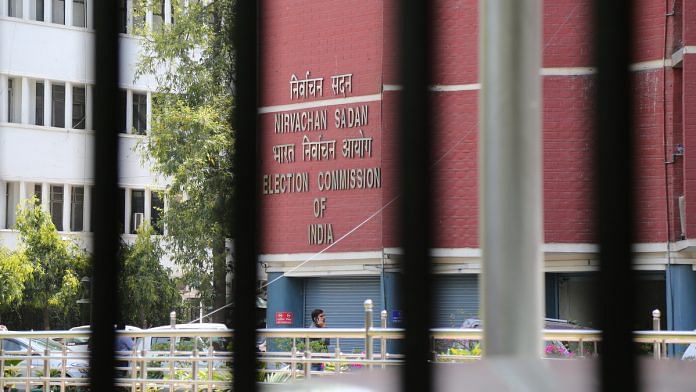New Delhi: The Election Commission is likely to reiterate its opposition to the central government’s controversial electoral bonds scheme in the Supreme Court, ThePrint has learnt.
Hearing a petition challenging the legality of electoral bonds, which are instruments of political funding, the Supreme Court had last week asked the Election Commission to file a reply even as it declined to issue an interim stay on the scheme.
The court initially gave the commission four weeks to reply, but changed the deadline to a fortnight when advocate Prashant Bhushan, representing petitioner Association for Democratic Reforms (ADR), said a month would be too late since the Delhi assembly elections are due on 8 February.
Speaking to ThePrint, a senior Election Commission official said the poll watchdog “has had a consistent stand as far as electoral bonds are concerned”. “We have opposed the scheme since 2017… There is no reason for us to change that stand,” the official added.
Also read: EC had flagged concerns over electoral bonds to Modi govt after Lok Sabha elections too
‘Retrograde step’
Electoral bonds are financial instruments brought in by the Modi government, which claims they aid transparency in political funding. Potential donors can buy the bonds in denominations of Rs 1,000, Rs 10,000, Rs 1 lakh, Rs 10 lakh and Rs 1 crore from SBI branches and hand them over to a party of their choice. The bonds neither carry the name of the donor nor the recipient.
In 2017, when the scheme was first notified, the EC, in a long communication to the law ministry, said introducing electoral bonds was a “retrograde step”.
“It is evident from the amendment which has been made that any donation received by a political party through electoral bonds has been taken out of the ambit of reporting under the contribution report as prescribed under Section 29C of the RP Act, 1951, and therefore this is a retrograde step as far as transparency of donations is concerned and this proviso needs to be withdrawn,” the EC had said in the letter dated 26 May 2017.
The EC was referring to Section 29 of the Representation of the People Act, which guides elections in India. The section calls for parties to declare the names of donors who give them amounts higher than Rs 20,000, but electoral bonds — introduced through an amendment in the Representation of the People Act, among other acts — are exempt from this rule.
In 2019, when the Supreme Court sought the EC’s response while hearing the plea challenging the scheme, the poll panel reiterated its stand.
Later the same year, the electoral bonds scheme was back in the news amid revelations that the Reserve Bank of India, the Election Commission and the Law Ministry were overruled by the government in the run-up to the introduction of the scheme.
Also read: India now has over 2,500 political parties, some suspected of ‘black money’ operations




Not much the ECI can do, one way or another. The ball is in the apex court’s court. It seems disinclined to make its presence felt on any issue of import to public governance.